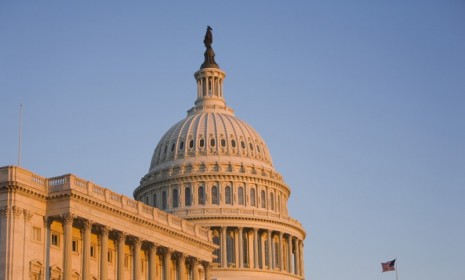The midterm polling 'roller coaster': 5 theories
Last week Gallup had a record 10-point GOP lead in its generic party matchup; this week, the two parties are tied. Is the race for control of Congress really that fluid?

A free daily email with the biggest news stories of the day – and the best features from TheWeek.com
You are now subscribed
Your newsletter sign-up was successful
Republicans and Democrats are both expecting this election year to be a bad one for Democrats, and hundreds of polls between now and Nov. 2 will attempt to predict just how bad. So far, the picture has been rather unstable, especially regarding the generic poll question of which party voters like best. Capping off a roller-coaster summer, Gallup last week reported a shocking 10-point GOP advantage, the party's biggest lead over Democrats since 1942; but this week, the same Gallup poll finds the parties are tied. Commentators respond to the volatility and consider the implications for the November elections:
1. Polls, especially generic ones, are unreliable
The lesson here is "live by the Gallup, die by the Gallup," says Howard Kurtz in The Washington Post. Gallup has been particularly erratic this summer, but all tracking polls are "volatile," and generic-party ones are the "most problematic." Elections aren't between parties; they're between candidates, "and incumbents usually win." Right, it's better to "just flip coins when it comes to generics," says William Jacobson at Legal Insurrection, "and focus on race-by-race analysis."
The Week
Escape your echo chamber. Get the facts behind the news, plus analysis from multiple perspectives.

Sign up for The Week's Free Newsletters
From our morning news briefing to a weekly Good News Newsletter, get the best of The Week delivered directly to your inbox.
From our morning news briefing to a weekly Good News Newsletter, get the best of The Week delivered directly to your inbox.
2. Last week was a good one for Democrats
The latest poll wasn't just a sampling glitch, says Gallup pollster Frank Newport. It was a definite "shift" toward Democrats after five weeks of GOP dominance. What happened? President Obama's approval ratings rose, following his return from vacation and national address on the end of the Iraq combat mission, and conservative "Glenn Beck's massive rally" drew tons of commentary. In coming weeks, we'll see if this shift is temporary.
3. The only poll that matters is enthusiasm — point, GOP
Other big national surveys also have Democrats and Republicans "virtually even in a generic poll," says Joel Connelly at the Seattle Post-Intelligencer. But more importantly, "all have shown a marked advantage for the Republicans in motivation to vote in the fall election," and that's the only metric that matters. This is great news for the GOP, which tends to do well "in low-turnout mid-term elections" — in their 1994 sweep, only 37 percent of voters showed up.
A free daily email with the biggest news stories of the day – and the best features from TheWeek.com
4. Real-life Republicans are less appealing that "generic" ones
Still, with all the "over the top" attention given the GOP's 10-point advantage last week, says Jed Lewison at Daily Kos, shouldn't the party's "biggest ever collapse" on Gallup be this week's "Really Seriously Huge Story"? Of course it wasn't — it doesn't fit the media narrative. But isn't it possible that "faced with the prospect of Republicans retaking the majority and returning to Bush-era economic policies, that the country is having second thoughts?"
5. Every poll has its limitations
The Gallup swing was a "stunning reversal," says Chris Cillizza in The Washington Post, but it shouldn't give Democrats too much hope. Gallup isn't measuring likely voters — the NBC/WSJ and Washington Post/ABC polls that did recently both gave the GOP a substantial lead. Gallup's "back and forth" is as a useful reminder that "no one poll contains absolute truth."